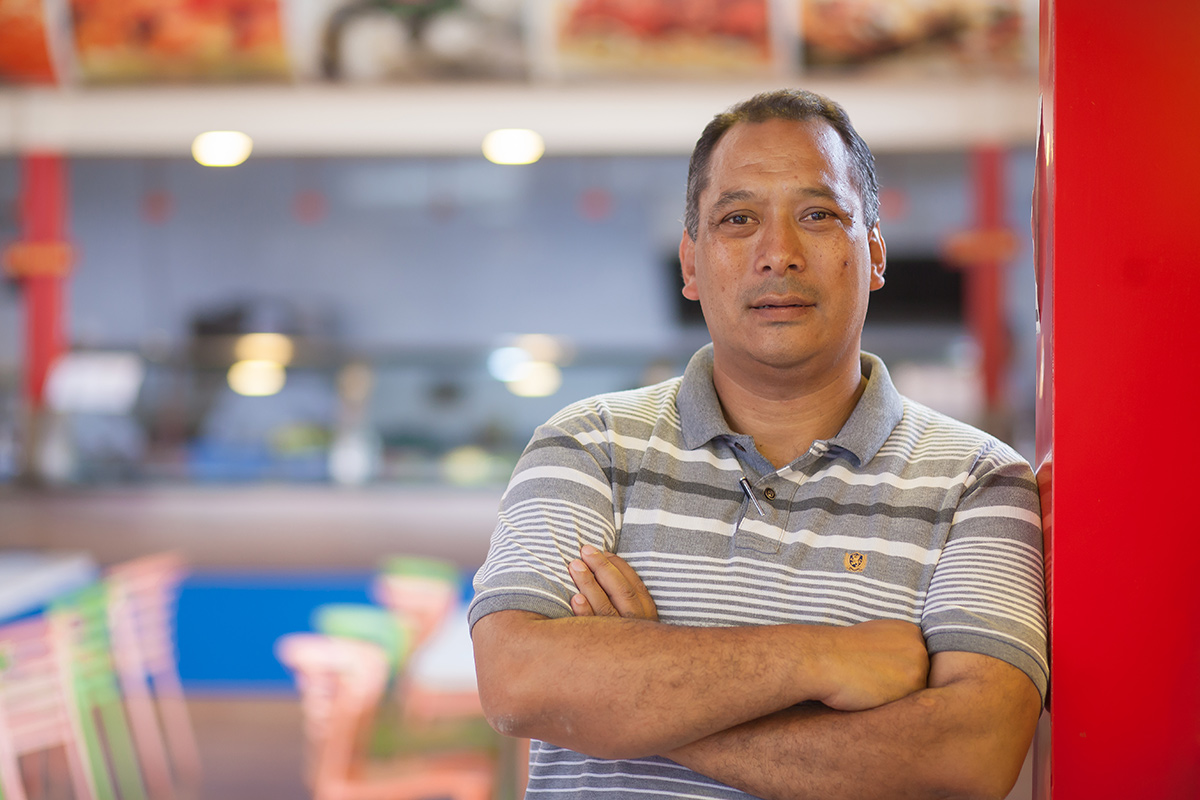
The Chairman for the Restaurant and Bar Association of Nepal, Arniko Rajbhandari is someone who has been part of the Nepali restaurant scene for most all of his life. Son of Dr. Heramba B. Rajbhandary who founded Nepal Dairy, Arniko Rajbhandari joined the family business as a young chemical engineer in 1997.
Today he is also a member of the board of directors at Nepal Dairy and its sister enterprise, ND’s Café and Restaurant. Having seen the restaurant and bar industry go through dark times as well as seen it flourish, Rajbhandari talks about the current situation that the food and beverage businesses are facing due to the pandemic, and what the future might be for the industry.

COVID 19 came as a shock to the restaurant sector and its implications have not subsided. What kind of implications you see on the ground?
The lockdown has had a very big impact on the restaurant, tourism and airlines industry. The tourist season usually spans spring and autumn. When the lockdown started, it was still Chaitra, which was still peak of the season. However this closure has spanned all the way to monsoon, sinking profits during a high earning time for restaurants. Tourist based restaurants have especially taken a big hit. These are the restaurants that need to make up for the low business during the off season. Right now, tourists coming Nepal during autumn is questionable. Due to this, restaurants are unable to stably pay the approximate 20% of monthly salaries to its workers, and another 15% in rent after the month of Chaitra. While restaurants tried their best to support workers through advance payments, it isn’t something that can go on indefinitely. Even for landlords, there are some for whom the rent they collect is the sole source of income. Some well-established restaurants have had to downsize. Hot Breads has had to shut down two of its outlets, and I think Bakery Café had to close three outlets. Other startups and restaurants in the making have had to close down completely. In ND’s alone, I have workers who are willing to walk seven kilometers everyday just to get to work. The workers are in a dire need of money. Another situation that restaurants face right now is the ability to retain our customers while ensuring job security for our employees. Whether through online delivery or a pickup system, customer retention is the key for now.
What effect will the closure of restaurants and bars have on suppliers?
Around 45% of the revenue that is generated by the restaurant industry supports the national produce market. But because of the pandemic, the 11-12 crores that was being spent here has dropped to zero. Since restaurants and hotels weren’t open and they had to conserve finances, all purchases were halted. Even the stocks that we had already bought had gone to waste. Primary level farmers faced a drastic shrinkage in their market. If the government had placed a restriction on produce and raw food products from India then perhaps these farmers wouldn’t have had to throw away truckloads of their produce. In fact, primary level farmers are the ones who have been most victimised. We are noticing major breakages in our supply chain right now.Most restaurants are operating on a semi-operational basis. Is this enough to allow these businesses to sustain?
The point of running restaurants right now is to only raise the operational costs of these businesses. This means taking care of the salary of the staff and delivering the house rent. We had to choose whether restaurants were to totally bear 100% of these costs or to operate partially and have these costs partially taken care of. Even now with restaurants opening partially, businesses are still be operating at loss. Right now, the main goal is to minimise losses. Another reason behind operating right now is to retain customers. For instance, if you were used to eating pizza from a particular restaurant, you are definitely more likely to purchase it online if it were available. However if your restaurant isn’t running, the customer is bound to get it from another restaurant. The next thing you know your regular clients will switch to your competitor. Once a customer has switched brands, it isn’t easy to bring them back. In terms of the health and safety issues, the restaurants are certainly going to be held responsible should a worker end up getting infected. However, we don’t have any other option besides opening up. Over four months has passed and there hasn’t been any relief package announced by the government, and the reserves that we had are close to depletion. What else can we even do to sustain our businesses and livelihoods?REBAN recently launched its own online delivery service. What was the purpose?
If restaurants were to suffer losses and start closing then there would be no point of having our organisation. We figured that while there are plenty of online food delivery systems, why not start one that works on a subscription basis. Right now, existing delivery companies take a certain percentage of the order. We thought instead of having to pay delivery companies a percentage, why not create a platform where restaurants can make use of their existing labour force in order to deliver from door to door. This isn’t something that hasn’t been done before. And we don’t want to compete with existing food delivery services. What we’re trying to achieve is to have smaller restaurants that don’t have access to digitisation or the ability to pay a percentage on every meal they sell to have an online platform for a low yearly subscription fee of Rs. 6000. This isn’t something we are doing for profit, rather it is an effort to sustain the restaurant industry through this tough time.What is the future like for restaurants in Nepal after the end of the pandemic?
Currently only about 25% of the restaurants are in operational mode. As the pandemic dies out and more and more restaurants and bars start opening up, the government really needs to come up with a solid strategy to take care of the hard-hit tourism sector. An example would be, if the government were to increase the weekend to Sundays people are less likely to stay at home all weekend and instead go outside to shop and eat. If the government were to create such an environment, internal tourism would rise as well. The restaurant sector too should understand the massive economic hit that our nation has taken. Restaurants and hotels should give priority to the use of domestics produce and raw ingredients, and only rely on imports when necessary. While these businesses will have to make compromises, in the long run this will make a big impact on the economic stability of our nation. Even at a primary level, if we could connect farmers directly to buyers, we could reduce costs as well as create a system were producers are assured that the ups and downs of the market won’t affect them. Furthermore, if restaurants were to shift focus from food items like burgers and pizzas, instead emphasise on more ethnic cuisines, this would increase employment opportunities of people from ethnic groups.
Published Date: August 12, 2020, 12:00 am
Post Comment
E-Magazine
RELATED ETC





